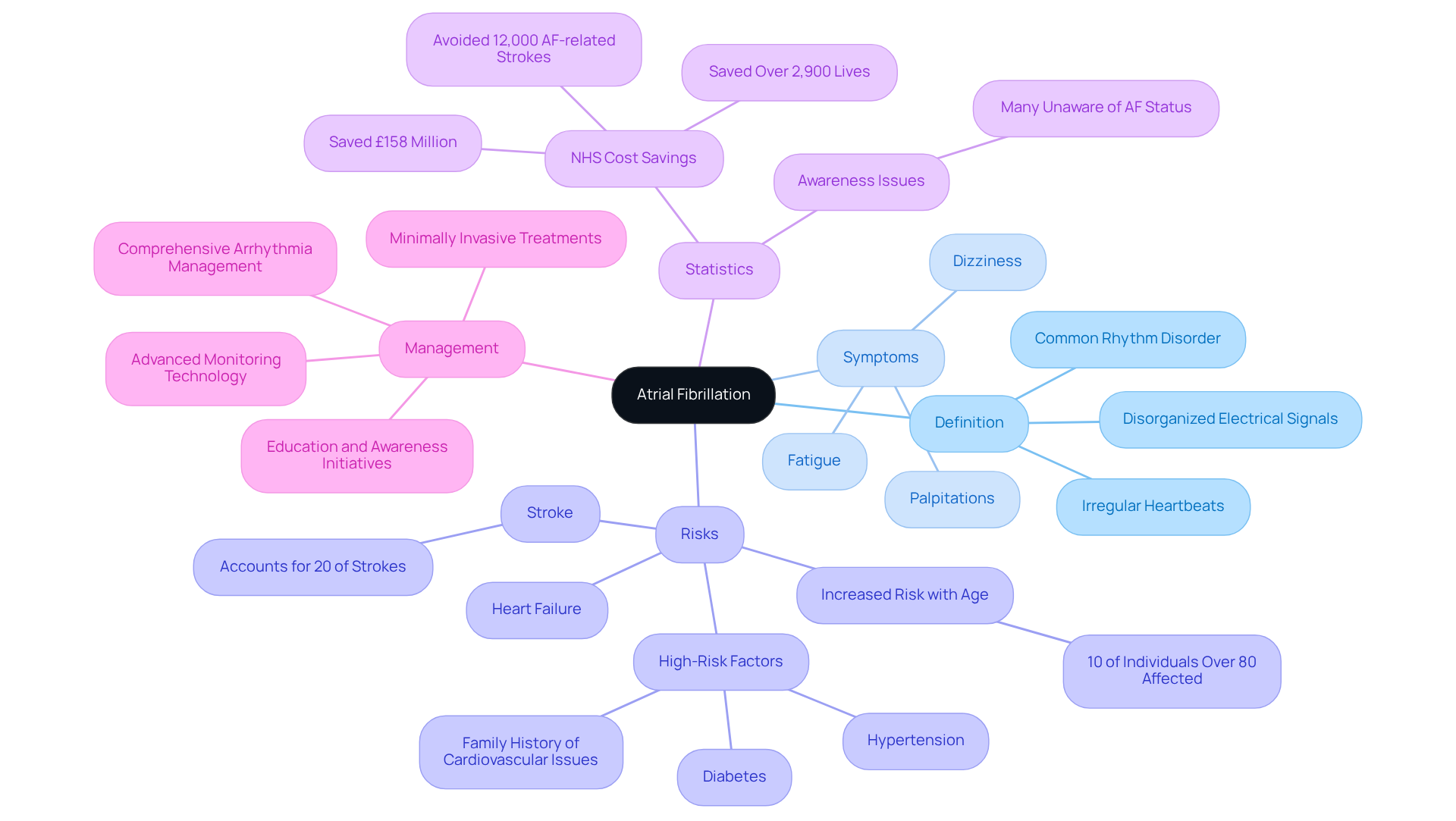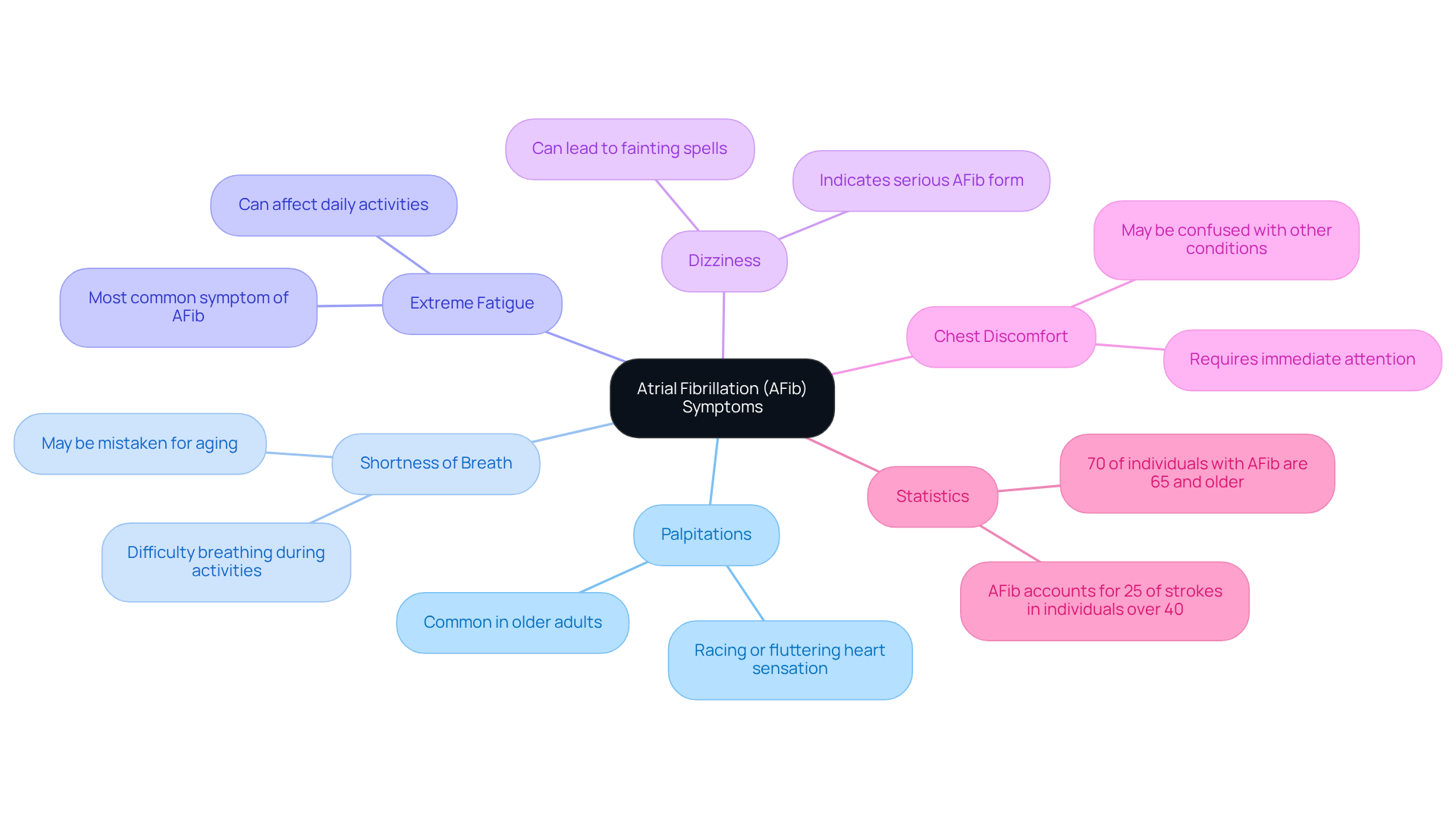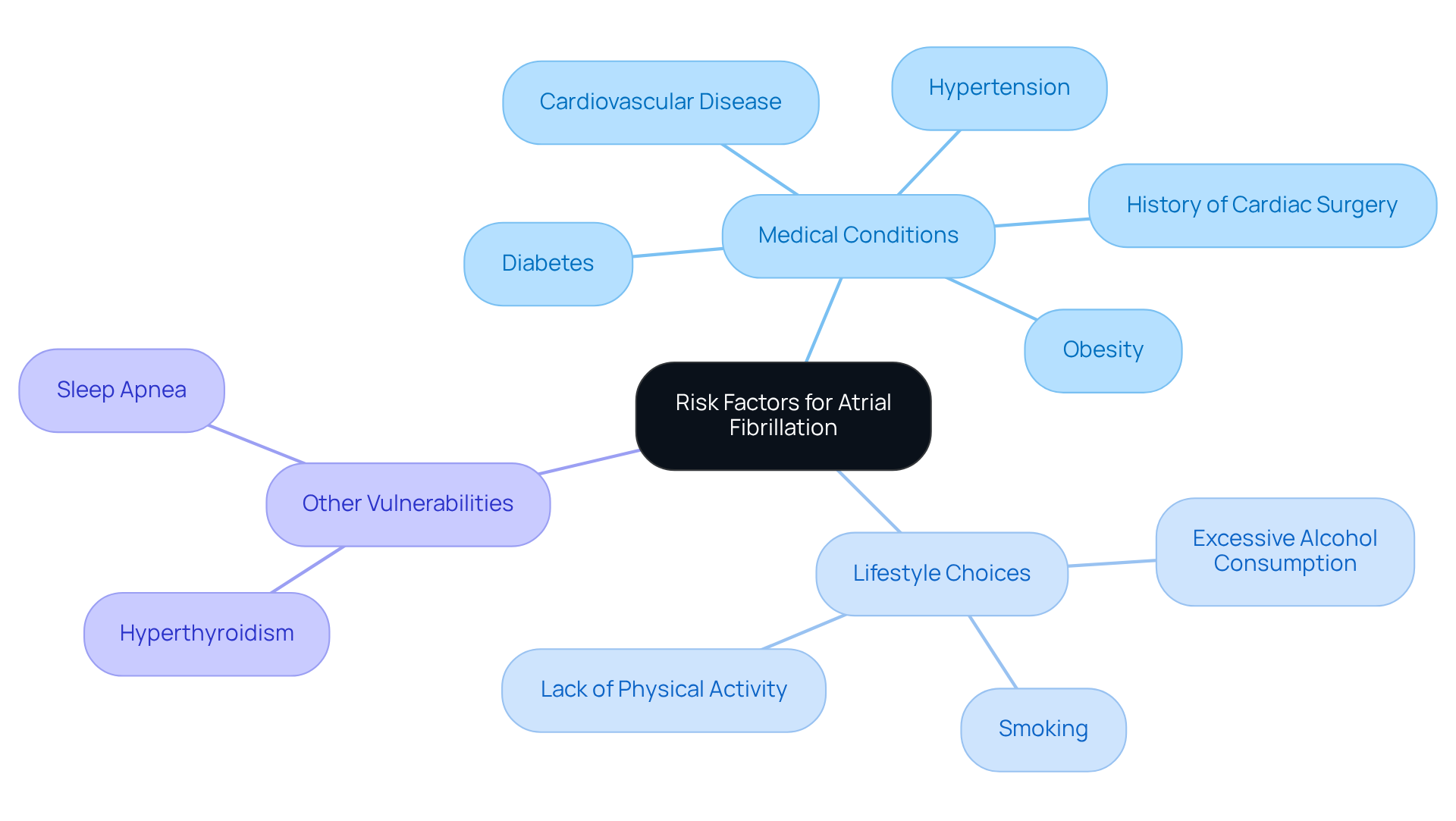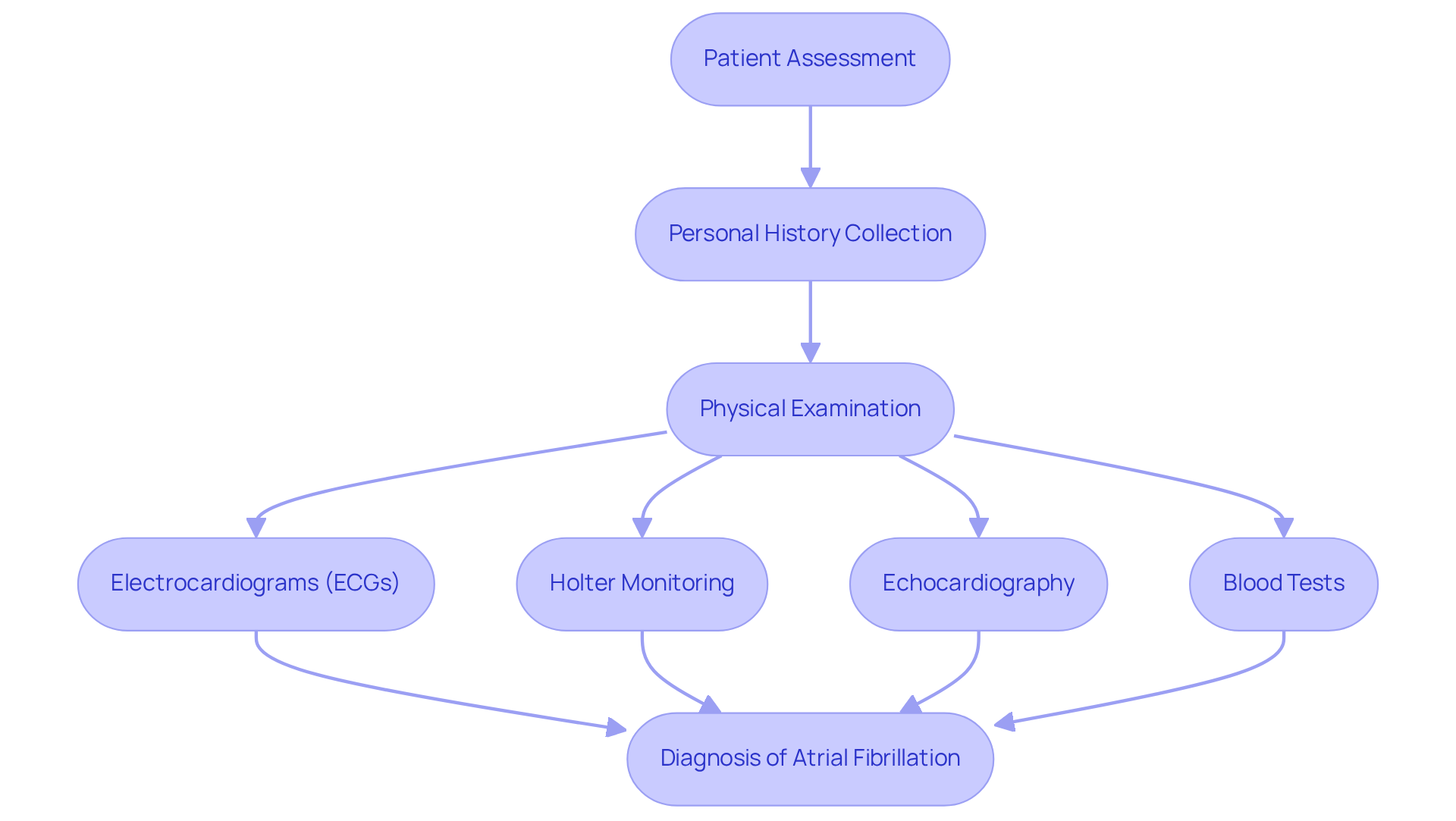


Atrial fibrillation (AFib) can be a concerning condition, marked by irregular and rapid heartbeats. Many people experience symptoms like:
These symptoms can truly impact their quality of life. It's essential to recognize these signs, especially in older adults. Have you or a loved one felt these symptoms? Early detection and intervention can make a significant difference, helping to prevent serious complications such as stroke and heart failure.
Statistics show that AFib accounts for a substantial percentage of strokes in older adults, underscoring the importance of awareness. In addition to this, understanding the risks can empower you to take action. If you notice any of these symptoms, please don’t hesitate to reach out for support. You deserve care and attention.
Remember, you’re not alone in this journey. There are resources and professionals ready to help you navigate your health concerns with compassion and expertise. Your well-being is a priority, and taking the first step towards seeking help can lead to a healthier, more fulfilling life.
Atrial fibrillation is a common heart rhythm disorder that can pose serious risks, especially for older adults. It’s important to understand that this condition can lead to severe complications like stroke and heart failure. Recognizing symptoms such as palpitations, dizziness, and fatigue is crucial for early detection and effective management. Unfortunately, many individuals may not realize they have this condition, often mistaking these alarming signs for normal aging.
How can you identify the subtle indicators of atrial fibrillation? Taking proactive steps to safeguard your heart health is essential. By being aware of these symptoms, you can seek the help you need and take control of your well-being. Remember, you’re not alone in this journey; support is available to guide you through understanding and managing your heart health.
Atrial fibrillation is a common rhythm disorder that can feel alarming, characterized by irregular and often rapid heartbeats. This condition arises when the heart's electrical signals become disorganized, leading to ineffective blood pumping. It’s important to understand that atrial fibrillation can lead to serious complications, such as stroke and heart failure, making it a significant concern for cardiovascular health, especially for older adults. As we age, changes in heart structure and function can increase the risk of this condition. In fact, about 10% of individuals over 80 years old are affected by atrial fibrillation, highlighting the urgent need for awareness and tailored management strategies for this age group.
Symptoms of atrial fibrillation can include palpitations, dizziness, and fatigue, which can greatly impact one’s quality of life. It’s crucial for senior patients to comprehend this condition, as early identification and intervention can significantly reduce associated risks. Did you know that atrial fibrillation accounts for 20% of strokes? This statistic emphasizes the importance of proactive monitoring and intervention. Unfortunately, many individuals remain unaware of their Afib status, which can lead to severe health consequences. Those at high risk, particularly individuals with diabetes, hypertension, or a family history of cardiovascular issues, should be especially vigilant.
At Amavita Heart and Vascular Health, we understand these concerns and provide comprehensive arrhythmia management. Our advanced monitoring technology helps identify specific types of arrhythmias, and we offer innovative, minimally invasive treatments that can restore your heart's natural rhythm. Dr. Martinez-Clark specializes in these minimally invasive valve treatments, adding depth to our care options.
Enhancing awareness and education about atrial fibrillation is vital for improving outcomes in this vulnerable population. At Amavita, we are committed to providing targeted cardiovascular care for high-risk patients. If you or a loved one is experiencing symptoms or has concerns about atrial fibrillation, please reach out to us. We’re here to support you every step of the way.

Symptoms of atrial fibrillation (AFib) can vary widely among individuals, and some may not experience any symptoms at all. Common signs to watch for, which can help you understand what does AFib look like, include:
For seniors, these symptoms might often be mistaken for normal aging or attributed to other health issues. This makes it crucial for caregivers and family members to stay vigilant.
In addition to these, episodes of fainting or near-fainting can indicate a more serious form of AFib that requires immediate medical attention. Recognizing what does AFib look like is vital for prompt diagnosis and effective management, especially in older patients who often have multiple health conditions. Geriatricians emphasize that being aware of these indicators can significantly improve outcomes, as unmanaged AFib can lead to severe complications like stroke and heart failure.
With Amavita's CardioElite™ program, which employs FDA-cleared AI ultrasound technology for bedside cardiac diagnostics, early detection of AFib is greatly enhanced. This innovative approach not only provides real-time guidance and rapid reporting on heart structure and function but also includes comprehensive evaluations and advanced imaging capabilities. This ensures that symptoms are accurately assessed and managed.
Statistics show that about 70% of individuals with AFib are 65 and older, highlighting the need for increased awareness and proactive monitoring in this age group. Furthermore, AFib is responsible for around 25% of all strokes in individuals over 40, underscoring the serious consequences of misdiagnosis or delayed recognition of symptoms. By utilizing advanced imaging and thorough evaluations, Amavita is dedicated to addressing these critical health concerns effectively.
If you or a loved one are experiencing any of these symptoms, please don’t hesitate to reach out for support. Your health and well-being are our top priorities.

Atrial fibrillation can be a concerning condition, especially for older adults. Several risk factors contribute to its development, including:
Lifestyle choices, such as excessive alcohol consumption, smoking, and a lack of physical activity, also play a significant role. Additionally, certain medical conditions like hyperthyroidism and sleep apnea can increase the risk of Afib.
Understanding these vulnerabilities is crucial for both individuals receiving care and healthcare providers. It allows for the implementation of preventive strategies, such as lifestyle changes and regular monitoring of heart health, to help reduce the risk of developing this condition.
At Amavita, we truly care about your heart health. Our CardioElite™ program offers advanced, data-driven care tailored for high-risk individuals. We ensure comprehensive evaluations and proactive management to effectively address these vulnerabilities. With the incorporation of AI technology, we provide round-the-clock cardiology consultations, enhancing proactive care management and significantly lowering the chances of readmissions.
This comprehensive approach is transforming cardiac care in skilled nursing facilities, and we’re here to support you every step of the way. If you have concerns about your heart health, don’t hesitate to reach out. We’re dedicated to helping you live a healthier, more fulfilling life.

If you’re feeling anxious about your heart health, you’re not alone. Diagnosing atrial fibrillation and knowing what does afib look like can seem daunting, but at Amavita, we’re here to support you every step of the way. Our healthcare providers take a compassionate approach, combining your personal history, a thorough physical examination, and advanced diagnostic tests to ensure you receive the best care possible.
At Amavita, we utilize the CardioElite™ system, which allows for comprehensive cardiac assessments right at your bedside. This innovative technology includes electrocardiograms (ECGs) that accurately capture your heart's electrical activity, helping to clarify what does afib look like with precision. In addition to this, we offer Holter monitoring with portable ECG devices that can track your heart's rhythm for 24 to 48 hours, which can help demonstrate what does afib look like during any sporadic episodes of atrial fibrillation. We also perform echocardiography, which uses ultrasound to evaluate your heart's structure and function.
You might wonder about other factors that could affect your heart health. That’s why we also conduct blood tests to check your thyroid function and other potential contributors. With the integration of AISAP's FDA-approved AI ultrasound diagnostic platform, we prioritize early and accurate diagnosis, which is crucial for effective management and reducing the risk of complications, including understanding what does afib look like.
At Amavita, we’re committed to expert arrhythmia management. Our goal is to provide you with innovative, minimally invasive treatments tailored to restore your heart's natural rhythm. We understand how important it is for you to feel supported and cared for, and we’re here to enhance your overall health and well-being. If you have any questions or concerns, please don’t hesitate to reach out. Your heart health is our priority.

Atrial fibrillation is a common heart rhythm disorder that can pose serious health risks, especially for older adults. It’s important to understand its nature, symptoms, and risk factors to manage and prevent it effectively. By recognizing the signs of AFib early, you can take meaningful steps to protect your heart health and lower the chances of severe complications like stroke and heart failure.
Throughout this discussion, we highlight the importance of being aware of AFib symptoms, which may include:
Caregivers and healthcare providers play a crucial role here, particularly for seniors who might mistakenly attribute these symptoms to normal aging. Additionally, we explore various risk factors associated with AFib, such as:
These factors can guide preventive strategies and interventions.
Ultimately, understanding atrial fibrillation is vital for improving outcomes for those affected. If you or someone you care about is at risk, seeking regular monitoring and timely medical advice is essential. With the help of advanced diagnostic technologies and comprehensive care programs, patients can manage their heart health more effectively. Taking action today can lead to a healthier tomorrow, ensuring that those impacted by AFib receive the support they need to live fulfilling lives.
What is atrial fibrillation?
Atrial fibrillation is a common rhythm disorder characterized by irregular and often rapid heartbeats due to disorganized electrical signals in the heart, leading to ineffective blood pumping.
Why is atrial fibrillation a significant concern for cardiovascular health?
Atrial fibrillation can lead to serious complications such as stroke and heart failure, making it a major concern, particularly for older adults who are at increased risk.
How prevalent is atrial fibrillation among older adults?
About 10% of individuals over 80 years old are affected by atrial fibrillation, highlighting the need for awareness and management strategies for this age group.
What are the symptoms of atrial fibrillation?
Symptoms can include palpitations, dizziness, and fatigue, which can significantly impact an individual's quality of life.
How does atrial fibrillation relate to stroke risk?
Atrial fibrillation accounts for 20% of strokes, emphasizing the importance of proactive monitoring and intervention to reduce risks.
Who should be particularly vigilant about atrial fibrillation?
Individuals with diabetes, hypertension, or a family history of cardiovascular issues should be especially vigilant regarding their atrial fibrillation status.
What services does Amavita Heart and Vascular Health provide for atrial fibrillation?
Amavita offers comprehensive arrhythmia management, advanced monitoring technology to identify specific types of arrhythmias, and innovative, minimally invasive treatments to restore the heart's natural rhythm.
Who specializes in minimally invasive valve treatments at Amavita?
Dr. Martinez-Clark specializes in minimally invasive valve treatments, enhancing the care options available for patients with atrial fibrillation.
Why is awareness and education about atrial fibrillation important?
Enhancing awareness and education is vital for improving outcomes in vulnerable populations, particularly for those at high risk of complications from atrial fibrillation.
What should someone do if they experience symptoms of atrial fibrillation?
If you or a loved one is experiencing symptoms or has concerns about atrial fibrillation, it is recommended to reach out to a healthcare provider for support and management.